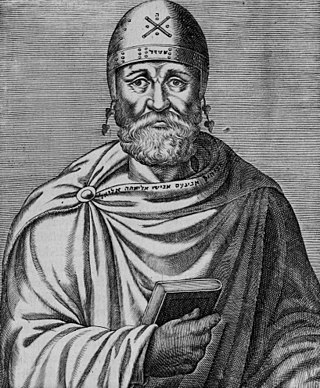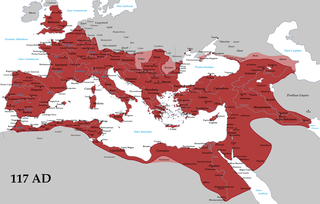Related Research Articles

Gaius Caesar Augustus Germanicus, better known by his nickname Caligula, was Roman emperor from AD 37 until his assassination in AD 41. He was the son of the Roman general Germanicus and Agrippina the Elder, Augustus' granddaughter. Caligula was born into the first ruling family of the Roman Empire, conventionally known as the Julio-Claudian dynasty.

Philo of Alexandria, also called Philo Judaeus, was a Hellenistic Jewish philosopher who lived in Alexandria, in the Roman province of Egypt.
This article lists expulsions, refugee crises and other forms of displacement that have affected Jews.
The history of antisemitism, defined as hostile actions or discrimination against Jews as a religious or ethnic group, goes back many centuries, with antisemitism being called "the longest hatred". Jerome Chanes identifies six stages in the historical development of antisemitism:
- Pre-Christian anti-Judaism in Ancient Greece and Rome which was primarily ethnic in nature
- Christian antisemitism in antiquity and the Middle Ages which was religious in nature and has extended into modern times
- Muslim antisemitism which was—at least in its classical form—nuanced, in that Jews were a protected class
- Political, social and economic antisemitism during the Enlightenment and post-Enlightenment Europe which laid the groundwork for racial antisemitism
- Racial antisemitism that arose in the 19th century and culminated in Nazism
- Contemporary antisemitism which has been labeled by some as the new antisemitism

The First Jewish–Roman War, sometimes called the Great Jewish Revolt, or The Jewish War, was the first of three major rebellions by the Jews against the Roman Empire fought in Roman-controlled Judea, resulting in the destruction of Jewish towns, the displacement of its people and the appropriation of land for Roman military use, as well as the destruction of the Jewish Temple and polity.
Tiberius Julius Alexander was an equestrian governor and general in the Roman Empire. Born into a wealthy Jewish family of Alexandria but abandoning or neglecting the Jewish religion, he rose to become the 2nd procurator of Judea under Claudius. While Prefect of Egypt (66–69), he employed his legions against the Alexandrian Jews in a brutal response to ethnic violence, and was instrumental in the Emperor Vespasian's rise to power. In 70, he participated in the Siege of Jerusalem as Titus' second-in-command. He became the most powerful Jew of his age, and is ranked as one of the most prominent Jews in military history.

The Jewish–Roman wars were a series of large-scale revolts by the Jews of Judaea and the Eastern Mediterranean against the Roman Empire between 66 and 135 CE. The First Jewish–Roman War and the Bar Kokhba revolt were nationalist rebellions, striving to restore an independent Judean state, while the Kitos War was more of an ethno-religious conflict, mostly fought outside the province of Judaea. As a result, there is variation in the use of the term "Jewish-Roman wars." Some sources exclusively apply it to the First Jewish-Roman War and the Bar Kokhba revolt, while others include the Kitos War as well.

Jewish identity is the objective or subjective state of perceiving oneself as a Jew and as relating to being Jewish. Under a broader definition, Jewish identity does not depend on whether a person is regarded as a Jew by others, or by an external set of religious, or legal, or sociological norms. Jewish identity does not need to imply religious orthodoxy. Accordingly, Jewish identity can be cultural in nature. Jewish identity can involve ties to the Jewish community. Orthodox Judaism bases Jewishness on matrilineal descent. According to Jewish law (halacha), all those born of a Jewish mother are considered Jewish, regardless of personal beliefs or level of observance of Jewish law. Progressive Judaism and Haymanot Judaism in general base Jewishness on having at least one Jewish parent, while Karaite Judaism bases Jewishness only on paternal lineage. These differences between the major Jewish movements are the source of the disagreement and debate about who is a Jew.

Judaea was a Roman province from 6 to 132 CE, which incorporated the Levantine regions of Judea, Samaria and Idumea, extending over parts of the former regions of the Hasmonean and Herodian kingdoms of Judea. The name Judaea was derived from the Iron Age Kingdom of Judah.

The Kitos War was one of the major Jewish–Roman wars (66–136). The rebellions erupted in 115 when most of the Roman armies were fighting Trajan's Parthian War on the eastern border of the Roman Empire. Major uprisings by Jews in Cyrenaica, Cyprus and Egypt spiralled out of control, resulting in a widespread slaughter of the remaining Roman garrisons and Roman citizens by Jewish rebels.

The Jewish Quarter is one of the four traditional quarters of the Old City of Jerusalem. The area lies in the southwestern sector of the walled city, and stretches from the Zion Gate in the south, along the Armenian Quarter on the west, up to the Street of the Chain in the north and extends to the Western Wall and the Temple Mount in the east. In the early 20th century the Jewish population of the quarter reached 19,000.
The Alexandrian pogrom, or Alexandrian riots were attacks directed against Jews in 38 CE in Roman Alexandria, Egypt.

The history of the Jews in Europe spans a period of over two thousand years. Jews, an Israelite tribe from Judea in the Levant, began migrating to Europe just before the rise of the Roman Empire. Although Alexandrian Jews had already migrated to Rome, a notable early event in the history of the Jews in the Roman Empire was the 63 BCE siege of Jerusalem.
This timeline of antisemitism chronicles events in the history of antisemitism, hostile actions or discrimination against Jews as members of a religious and/or ethnic group. It includes events in Jewish history and the history of antisemitic thought, actions which were undertaken in order to counter antisemitism or alleviate its effects, and events that affected the prevalence of antisemitism in later years. The history of antisemitism can be traced from ancient times to the present day.
Hellenistic Judaism was a form of Judaism in classical antiquity that combined Jewish religious tradition with elements of Hellenistic culture. Until the early Muslim conquests of the eastern Mediterranean, the main centers of Hellenistic Judaism were Alexandria in Egypt and Antioch in Syria, the two main Greek urban settlements of the Middle East and North Africa, both founded in the end of the fourth century BCE in the wake of the conquests of Alexander the Great. Hellenistic Judaism also existed in Jerusalem during the Second Temple Period, where there was a conflict between Hellenizers and traditionalists.

The Second Temple period or post-exilic period in Jewish history denotes the approximately 600 years during which the Second Temple stood in the city of Jerusalem. It began with the return to Zion and subsequent reconstruction of the Temple in Jerusalem, and ended with the First Jewish–Roman War and the Roman siege of Jerusalem.
The Balfour Day riots, took place between 2 and 3 November 1945. The riots began as anti-Jewish demonstrations on the 28th anniversary of the Balfour Declaration. Rallies were organised by the right-wing Young Egypt Party and Hassan al-Banna's Muslim Brotherhood.
The 1838 Druze attack on Safed began on July 5, 1838, during the Druze revolt against the rule of Ibrahim Pasha of Egypt. Tensions had mounted as the Druze captured an Egyptian garrison outside of Safed. The local Safed militia of several hundred was heavily outnumbered by the Druze, and the city was gripped in despair as the militia eventually abandoned the city and the Druze rebels entered the city on July 5. The Druze rebels and a Muslim mob descended on the Jewish quarter of Safed and, in scenes reminiscent of the Safed plunder four years earlier, spent three days attacking Jews, plundering their homes and desecrating their synagogues. Some Jews ended up leaving the town, moving south to Jerusalem and Acre. Among them was Yisrael Bak, whose printing press had been destroyed a second time.
Extensive riots erupted in Alexandria, Roman Egypt, in 66 CE, in parallel with the outbreak of the First Jewish–Roman War in neighbouring Roman Judea.
The history of the Jews in Alexandria dates back to the founding of the city by Alexander the Great in 332 BCE. Jews in Alexandria played a crucial role in the political, economic, cultural and religious life of Hellenistic and Roman Alexandria, with Jews comprising about 35% of the city's population during the Roman Era. Alexandrian Jewry were the founders of Hellenistic Judaism and the first to translate the Torah from Hebrew to Koine Greek, a document known as the Septuagint.
References
- ↑ Guido Bastianini, "Lista dei prefetti d'Egitto dal 30a al 299p", Zeitschrift für Papyrologie und Epigraphik , 17 (1975), p. 271
- ↑ Joseph Modrzejewski (1997). The Jews of Egypt: From Rameses II to Emperor Hadrian. Princeton University Press. pp. 165f. ISBN 0-691-01575-9.
- 1 2 Richard James Horatio Gottheil and Samuel Krauss, "Flaccus", The Jewish Encyclopedia ; New York: Funk and Wagnall's, 1906.
- ↑ Philo of Alexandria, Flaccus, ch. VIII (53-57)
- ↑ Philo, Flaccus , Chapters 6 - 9 (43, 53-56, 62, 66, 68, 71-72); translation by Charles Duke Yonge, 1855.